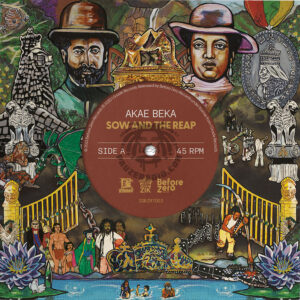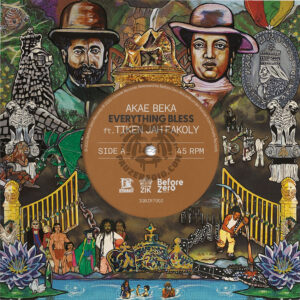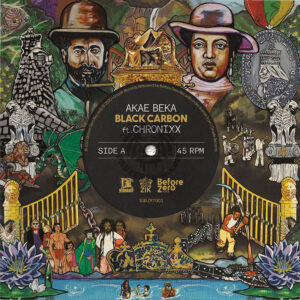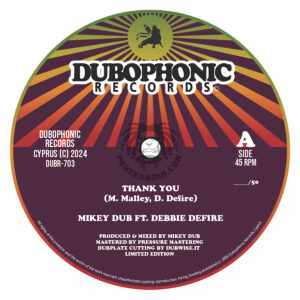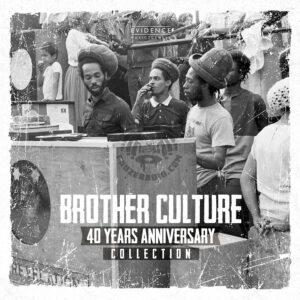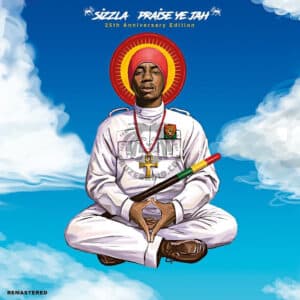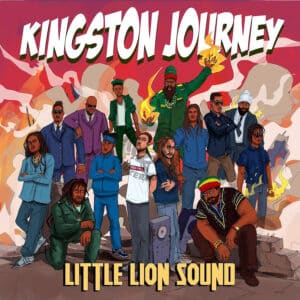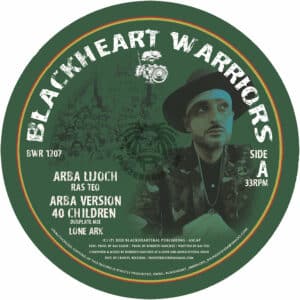
Tarrus Riley – Healing – Review
Tarrus Riley: Healing Album Review by Mr Topple for Pauzeradio.com.
It’s been a strange, unsettling year for many of us; odd in itself that a virus can alter the collective human experience across the world. Many of us are probably in need of some ‘healing’ right now. So, enter Tarrus Riley to answer our calls.
Tarrus Riley Healing, released via JukeBoxx Productions and distributed by Zojak Worldwide, is an album wholly constructed during lockdown. Production comes from Shane C. Brown, Dean Fraser and Riley across all tracks bar one. And it’s perhaps a testament to the talents of these three artists that the project is a melting pot of genres, styles and influences – yet still has complete fluidity across it.
It opens with The Week/Weak – a distinctly pared-back, RnB-driven piece, glorious in its intro with Mitchum Khan Chin’s guitar and Kirk Bennett’s piano running arpeggio chords, before the former does a delicious upward glissando, ushering in the track proper. A wholly unfussy arrangement, the drums focus on snare brushes and lightly-touched hi-hats. Chin’s guitar does a half-time skank across two lines, with additional delicate riffing and gently strumming chords. Bennett’s bass is cleverly engineered to serve as a background role, merely leading the chord progressions from the keys – and that’s it. But it’s all that needed, as Riley’s expressive and poignant vocal is central to The Week/Weak. A fitting and uplifting opening.
This leads directly into a change of tack with Great Equalizer, featuring a quite brilliant trumpet from Okeil McIntyre. A throwback to the Funky Soul of the 80s, the component parts have been smartly arranged to create a forceful yet unpretentious wind. The drum arrangement is superb – with its incessant, every-beat kick, offbeat hi-hats and dampened snare along with snaps on the two and four. Bennett’s bass is rich and resonant, but again not overbearing – picked and running a deep, syncopated rhythm. Keys tread a delicate melodic accompaniment, doing a bass clef-led response to the main melodic line at the end of some bars. But guitars are the force that drives the Funk wind, running a choppy, RnB skank with additional, whining riffing. McIntyre’s trumpet does an interplay with Riley’s vocal at times, and there’s some lovely, ‘vocodered’ backing vocals from Fraser. The inclusion of some distinctly 80s synths and a fleeting electric organ, heavy on the vibrato, finishes the Funky Soul vibe off perfectly – and the whole package is smooth, retrospective piece; in itself a clever juxtaposition with the 2020 pandemic-led lyrics. Glorious.
The album’s title track, previously released as a single, sees Riley and Co delve deeper into Funky Soul, but this time with some more experimental flavours. The arrangement is fascinating, not least among the drums. Dominant is the snare, running military style rolls at points, giving the track an urgent sense of something impending. The rest of the drum arrangement consists of some distinctly Afrobeats rhythmic patterns, seeing the snare also being used across dual roles: open skinned and brushed. Its stuttering interplay with the hi-hats is enhanced on the main part of the versed and chorus, driving the track forward. A deep, imposing bass uses a similar rhythmic motif to the main melody at points, creating a real depth of sound which emphasises the lyrical content well. The additional inclusion of Chin’s acoustic guitars running arpeggio, then complete, chords is deftly done. Synth strings are used, doing heavily engineered chords across breves which have been EQ’d to sound almost like choral vocals. And the distinctly RnB-meets-Doo-Wop ‘actual’ backing vocals are wonderful – mixing up multi-layered harmonisation then work across vowel sounds. The whole thing is thought-provoking, stirring but also endemically unsettling; wholly reflective of the pensive lyrical content. Powerful works.
Teejay comes on board Tarrus Riley Healing with Riley and Fraser’s backing vocals across Babylon Warfare. In some respects, it’s a thoroughly modern, Hip Hop cut – not dissimilar in its vibes to parts of Protoje’s latest album, In Search Of Lost Time. The doom-laden use of a helicopter sample at the start sets the brooding tone well, which is encapsulated across much of the instrumentation. The bass is back on a rhythmic motif again, but here has been engineered to focus on the very low end of the kHz register (all very Trap, with some added distortion just to hone the style), and melodically running fairly complex patterns across the diatonic scale. Guitars do an incessant semiquaver riff, which complements the bass well. Drums focus heavily on the two and four, but the almost uncontrolled hi-hats are again very Trap – rhythmically working around demisemiquavers at points, which occasionally build into those Trap buzz rolls. The sombre samples and synths build the level of musical discomfort further and Teejay’s vocal is quite brilliant – full of urgent cautiousness and premeditated soothsaying about our potential doom under the current system; complimenting Riley’s equally affecting line well. Overall, Babylon Warfare is an unpleasant and disconcerting affair – endemic of the lyrical content.
Riley pays direct homage to his late father Jimmy Riley with a version of Poor Immigrants, featuring additional vocals from Brown. The original, Rub-a-Dub style has been in part honoured – keeping the key the same, with the bass running an almost identical, drop-beat riff that mimics the main melody across diatonic notes. A one drop still exists and keys do a bubble rhythm, too – with a gently riffing guitar also still there. But additional instrumentation and arrangement includes what sounds like an atenteben dipping in and out at points; plus, some more pointed breaks and samples – giving more of a Dub vibe to this interpretation. But Riley and Co have done a sympathetic job of recreating a song, whose thematic content is sadly still relevant today – and whose familial origins make it especially poignant.
The track Family Tree marks a direct move into Reggae (but with a clever, Soca opening). Traditional in its arrangement, all the usual devices are in play: a skanking guitar with additional riffs; drums on a one drop; the bass running a syncopated, melodically root-triad dominated drop beat rhythm and keys doing a bubble rhythm. Chinsea Lee’s backing vocals are lovely – full of expressive crescendo and decrescendo, running adjacent harmonies to Riley’s main line along with call and response duties. And Fraser’s sax and McIntyre’s trumpet, with their punchy, tongued interventions, finish off Family Tree as a fresh, feel-good but strongly messaged cut.
Producer Rvssian gets to make his mark along with the sublime Shenseea, on Lighter. And make their mark they do – as it’s Healing’s first proper AfroDancehall cut, which leans more towards the Afro-RnB sound than the harder, abrasive style. The deep, imposing 808 drives the track, working across that broken Dancehall clave (‘oneeeeee-twooo-and’) before hitting two beats on the second bar; having the effect of smoothing the sound. Drums, led by Trappy hi-hats and snares, stutter – in keeping with the genre. But it’s the additional instrumentation which takes Lighter more towards the softer end of AfroDancehall – including the gorgeous use of various synths, from a bottle bell to an atenteben (or similar) and some cleverly placed samples. Moreover, Shenseea is on top form across the track – swerving between an enigmatic singjay and a rich, soulful vocal – which intersects with Riley’s well. Cleverly arranged and expertly executed.
Connect Again, featuring Dancehall master Konshens, continues with the extremely modern sound – furthering the Afro-RnB style to create something almost otherworldly and futuristic. Of note is that the change in producers, back to Brown and Fraser, is seamless from Rvssian’s track – marking the skill of the former two as creative forces. It’s slower BPM-wise than Lighter and has a more stripped-back feel. The syncopated drum arrangement is still there, leading the Afro vibe in a similar manner to Lighter. But the bass has been smoothed out further, generally working around two beats in the bar. There’s a smart use of an electric guitar – giving the briefest of riffs and skanks. Some gorgeous, plucked and staccato strings run semiquaver phrases across the chorus – bringing some delicate momentum with them. Samples, that eponymous bottle bell synth and some well-placed reverb finish off this affecting concoction well – with a sentiment many of us can probably relate to.
The incredible and always on-point Dexta Daps joins Riley across My Fire. It’s an overly brooding, Ambient RnB cut: smooth yet edgy, and bang-up-to-date – although not quite into the unsettling Toronto vibe pioneered by Drake et al; maybe nearer a modern take on the Two Step led sound led by Timbaland and Rodney ‘Darkchild’ Jerkins during the late 90s. This is led by the drums: the snare making the two and four the dominant beats, but supplementing this with additional rim clicks across syncopated, rapid rhythms. Hi-hats are equally frantic but less emphasised, while the kick leads the one and three. The overall effect of this complex arrangement is to create that almost Two Step percussive feeling, aside from a bridge which takes a momentary stop in Hip Hop. But the rest of the instrumentation is distinctly more RnB. Guitars strum chords at points, while the bass is elongated and deep, running across drawn-out notes. But at points we’re back to that late 90s sound, with the brilliant inclusion of a G-Funk whistle, transporting us to somewhere on Blackstreet. More modern synths and samples bring My Fire back to 2020, and the vocals from Daps are absolutely superb – filled with inflections of Soul interpretation showcasing his wide-ranging versatility. It’s engaging, beautifully arranged and expertly delivered.
T.I.M.E. (Together In Moments Everlasting) is ostensibly a RnB-Pop ballad – something which would sit comfortably in the realms of Mariah Carey’s late 90s work. Once again, the team show that they are sometimes at their best when the arrangement is unfussy and stripped back. Because here, Riley’s emotive and affecting vocal is given full flight by the accompanying instrumentation. A simple piano line from Wade Johnson works around that RnB ballad staple: the right, bass clef hand driving the chord progressions while the left (in the lover treble clef) runs a countermelody to Riley’s main line. The bass is smooth, rich and elegant – providing depth to the track as opposed to momentum. There’s a clever use of the drums, again ensuring that they are not the dominant force – and Fraser’s sax solo bridge is pure class: filled with expressive, waxing and waning vibrato and pointed use of dynamics. But this is Riley’s show – and it demonstrates his searing ability as a straight, Soul vocalist extremely well. Compelling and gorgeous.
Riley takes a very traditional, Nyabinghi route with the cinematic, haunting and moving Remember Me, featuring a stunning flute solo from Zoë Brown and Riley’s children Akilah Joy, Tsehai and Mekiem. You can read Pauzeradio’s full review of the track here:
The album Tarrus Riley Healing concludes with Blessings – a thoroughly fitting ending to all that came before it, as it is upbeat, positive and lightly touched from all involved. Not quite Reggae, it’s nearer a stomping Gospel/RnB track in its formation. The drums focus on the higher kHz instrumentation on the verses, with hi-hats gently tinkering around. But on the chorus, it goes full-on emphatic Gospel, with the kick driving every beat and the snare hitting the two and four – a well-constructed juxtaposition. An electric guitar generally skanks, running some nice, responsive riffs with the mid and treble turned way up to create a shrill, whining sound. Michael Fletcher’s bass is very well executed: picked, full of momentum but melodically running generally around the first three tones either side of the tonic of the root chord. Fraser is back with the irrepressible sax, fomenting the Gospel vibe as do the heavily harmonised and layered backing vocals. It’s utterly gorgeous and invigorating – serving as a wonderful bookend to the project.
Tarrus Riley Healing is musically deft and inventive. And lyrically, Riley and the team have created something entirely accessible and time capsule-like in terms of how it has documented a moment in history and people’s responses to it. It cascades across many emotions and themes, centred around the human experience but also the system’s influence over it. Healing is powerful yet vulnerable; positive yet cautious and triumphant yet humble. But moreover, it will resonate with many of us – given much of our shared collective experience.
Perhaps Tarrus Riley Healing’s most stand-out point is the diversity of styles on display. Riley has always been the master of sweeping across genres, and here is no exception. But what he and the team have done so well is to ensure synergy exists throughout. The shift from Funky Soul to Nyabinghi via Reggae, Gospel, AfroDancehall, RnB-Pop and Trap would, on paper, seem challenging and potentially ludicrous. But here, it is seamless; a credit to the production team’s technical skills but also their vision. It’s also a testament to Riley’s skill as a vocalist, as again he turns his voice to any style required, from Soul singer to Reggae singjay via Dancehall toaster. The entire project feels effortless – the sign of a really accomplished end-result.
Tarrus Riley Healing is a triumph. It would be remiss to give additional leeway to the quality of the album due to it being produced during lockdown. And it doesn’t need it, anyway – as you’d never know it was created under such difficult circumstances. Bold, epic and sweeping in its expansiveness, Riley, Brown and Fraser have excelled themselves with a project that enamours itself to you, being seared onto your memory long after the pandemic is a distant thought. On the list as one of the releases of 2020.
Tarrus Riley Healing album review by Mr Topple (28th August 2020).





